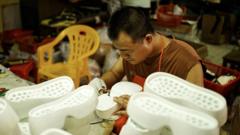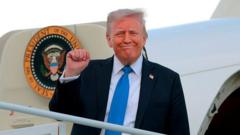Small business owners share their concerns and strategies amidst the ongoing trade tensions between the US and China.
Chinese Small Businesses Struggle Under Trump's Tariffs

Chinese Small Businesses Struggle Under Trump's Tariffs
A closer look at how US tariffs on Chinese goods are stalling local businesses in China.
Amid rising tensions between the US and China, small businesses in China are encountering significant hurdles due to President Donald Trump's extensive tariffs on Chinese imports. Lionel Xu, owner of Sorbo Technology, is perplexed by the economic landscape where his once-popular mosquito repellent kits now languish in warehouses instead of being shipped to their primary market in the US. “This is so hard for us,” Xu laments, underscoring the impact tariffs have had on his company, particularly since 50% of its output is typically destined for American buyers.
Nearby, Amy from the Guangdong Sailing Trade Company echoes similar sentiments, sharing that production has ground to a halt as all products now remain stockpiled. “All the products are in the warehouse,” she states, amid a stark reality seen throughout the expansive Canton Fair in Guangzhou, where business deals and international trade are central themes.
In response to tumultuous stock markets and global economic fluctuations, Trump instigated a temporary pause on many tariffs and yet maintained high import duties targeting Chinese goods. This tit-for-tat trade war has left approximately 30,000 exhibitors at the fair unsure of their future. Many American firms are now struggling to justify the increased costs of Chinese products, leading to fear that the ongoing disharmony between the two economic giants will become a protracted issue.
Despite this, Chinese merchants remain resilient, with some declaring a willingness to shift focus to their local market. “If they don't want us to export – then let them wait," says Hy Vian, a buyer looking for electric ovens. With a domestic market of 1.4 billion people, potential still exists for these businesses. Yet a sluggish economy, compounded by stagnant property values, has many middle-class consumers tightening their spending.
The trade war is already reaping consequences for factory workers, many of whom are facing drastic pay cuts. One factory worker expressed skepticism about finding decent employment, explaining, “Things are not going well,” amid the rising number of job losses linked to the tariff-driven economic landscape.
The Chinese economy's heavy reliance on exports means that the consequences of this crisis could ripple both ways, potentially leading to higher goods prices in the US and economic repercussions domestically and abroad.
As companies at the Canton Fair search for solutions, some are exploring new international markets, including Europe and the Middle East, to counteract the fallout from reduced US trade. “The Americas are too tricky,” asserts Mei Kunyan, highlighting the need for agility amidst uncertainty in transnational business.
With little prospect of resolution in sight, the ramifications of this complex trade dispute will certainly continue to unfold, impacting businesses and economies on both sides of the Pacific.





















